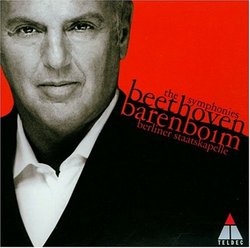| All Artists: Ludwig van Beethoven, Daniel Barenboim, Staatskapelle Berlin, Soile Isokoski, Rosemarie Lang, Robert Gambill, René Pape, Chor der Deutschen Staatsoper Berlin Title: Beethoven: The Nine Symphonies - Barenboim / Berliner Staatskapelle Members Wishing: 0 Total Copies: 0 Label: Teldec Release Date: 4/25/2000 Album Type: Box set Genre: Classical Styles: Historical Periods, Classical (c.1770-1830), Symphonies Number of Discs: 6 SwapaCD Credits: 6 UPC: 639842783828 |
Search - Ludwig van Beethoven, Daniel Barenboim, Staatskapelle Berlin :: Beethoven: The Nine Symphonies - Barenboim / Berliner Staatskapelle
 | Ludwig van Beethoven, Daniel Barenboim, Staatskapelle Berlin Beethoven: The Nine Symphonies - Barenboim / Berliner Staatskapelle Genre: Classical
Beethoven has been a dominating presence in Daniel Barenboim's musical life, from his early years as a piano prodigy to his long-held international podium career. He recorded the piano sonatas twice and the concertos three... more » |
Larger Image |
CD DetailsSynopsis
Amazon.com Beethoven has been a dominating presence in Daniel Barenboim's musical life, from his early years as a piano prodigy to his long-held international podium career. He recorded the piano sonatas twice and the concertos three times--as soloist with Otto Klemperer, as conductor accompanying Artur Rubinstein, and as conductor from the keyboard(!). When it came to tackling the nine Beethoven symphonies in toto, however, Barenboim bided his time. The results add up to one of the most commanding, insightful, and stimulating Beethoven cycles ever to be released. As a Beethovenian, Barenboim is very much an exponent of the German symphonic school, favoring weighty sonorities, expansive tempi, and full-throated dynamism. Well-known conductors as disparate as Böhm, Sanderling, Kletzki, Tennstedt, Walter, Bernstein, and Klemperer come out of this tradition, as does Wilhelm Furtwängler, whom Barenboim ardently admires. While Barenboim has clearly absorbed key elements of Furtwängler's Beethoven (the spiritual and dramatic grip, plus long-range harmonic tension), the younger conductor is no carbon copy of his hero. Moreover, few (if any) Furtwängler recordings boast orchestral execution at the extraordinary level of the Berliner Staatskapelle here, achieving more heft and finesse than on their previous cycle under Otmar Suitner on Denon. Their playing never lets up in fervency and commitment, the few missed notes and anticipated entrances insignificant. The brass resonates like old gold, the winds are no less colorful, and the dark, articulate strings at once caress and scorch. Likewise, the all-important timpani parts emerge with greater clarity than in many other Beethoven cycles, and the close-miked singers in the Ninth Symphony's finale add much to that movement's inner vitality. Barenboim observes nearly every repeat, and opts for such traditional reinforcements as the extended trumpet line in the Eroica Symphony's first movement coda and added brass in the Ninth's scherzo. Teldec's spacious yet dynamic engineering suits both the music and Barenboim's conceptions to a tee. In sum, these potent, concentrated, and powerfully inflected performances reveal the extraordinary degree to which Barenboim has internalized the German Beethoven tradition and made it his own. --Jed Distler Similar CDs
|
CD ReviewsOne of the best beethoven cycles around. A. Michaelson | Bay Area, CA | 04/26/2001 (5 out of 5 stars) "I bought this box set of Beethoven's nine symphonies, and before listening to it, I was rather skeptical of the performance quality. I have other Barenboim performances and know of his talent as a musician, especially with the works of Beethoven, however I didn't think that he could transfer this ability over to conducting. This set proved me wrong. Barenboim gives one of the best conducting performances in what is probably overall the best Beethoven cycle around, both in performance and sound quality. The tempi are perfect, the orchestra plays magnificently with great articulation and emotion, and the digital recording offers a sound quality that cannot be surpassed by any of the other great Beethoven cycles. Some other reviewers have said that the set is good but the Fifth Symphony is weak. I'm going to have to say that the Fifth is the weakest of the set, however, that doesn't mean it's a weak performance, just doesn't seem as inspired as the others; it is, nevertheless, still better than a large majority of the other versions out there. Great, great, great box set. The ninth is probably the best performance around, and all the other symphonies are also great. Highly recommend this new recording of the most famous set of symphonies in music." Old fashioned Beethoven at its very best John Kwok | New York, NY USA | 03/28/2001 (5 out of 5 stars) "In the liner notes to this superb set of Beethoven's symphonies, Barenboim notes that he has taken some liberties with the new Jonathan Del Mar-edited scores by following traditional practices established by great conductors such as Furtwangler. The results are a somewhat conventional set of Beethoven's symphonies that are brilliantly performed by the Berlin Staatskapelle; these well-balanced recordings are unquestionably among the finest produced by Teldec's engineers (I'm sure that the DVD versions of these are absolutely stunning.). The Berlin Staatskapelle's lush, warm playing is quite akin to the Berlin Philharmonic of the early 1960's under von Karajan's baton. Yet these performances don't have the loud brashness or swagger of Karajan's acclaimed 1960's cycle. In stark contrast, Barenboim seems comfortable assuming several personas as a conductor, ranging from lyrical in his conducting of the 6th Symphony to loud, almost Wagnerian, in his interpretation of the 9th Symphony. Aside from these, other exceptional performances include his interpretations of the 3rd, 7th and 8th. The only major disappointment is his rather sedate conducting of the 5th, which isn't as inspiring as the Kleiber/Vienna Philharmonic, Bernstein/Vienna Philharmonic, Giulini/Los Angeles Philharmonic, Harnoncourt/Chamber Orchestra of Europe or Abbado/Berlin Philharmonic recordings. Barenboim shows that he is a fine interpreter of Beethoven. I eagerly await any future recordings he may have with the Berlin Staatskapelle as both conductor and soloist of the entire Beethoven piano concerto cycle." Magnificent in places, mannered in others cdsullivan@massed.net | Cambridge, MA USA | 02/15/2002 (4 out of 5 stars) "Barenboim's approach to these pillars of the classical repertoire is very similar to that of Furtwängler: modify tempi during the course of a movement in hopes of conveying the expression of the section to a greater degree. I have mixed feelings about this approach: one the one hand, it works very well in the most dramatic, intense works like the Fifth and the Ninth (when used moderately). On the other hand, in much of Beethoven's music, I don't think this shifting is appropriate. For example, in the Haydenesque first two symphonies, the relatively straightforward material needs an appropriately straightforward approach. In a Haydn or a Mozart symphony, you won't (or at least shouldn't!) find tempi fluctuating all over the place. And in general, I think switching tempi in the middle of the piece where the composer didn't indicate anything is both presumptuous and inappropriate ... at least in Classical pieces. Romantic pieces are a different story, and I think can greatly benefit from tempo adjustment, but Classical pieces have a clearer sense of structure and performances need to uphold that.To choose a few representative examples of Barenboim's approach: in the famous first movement of the Fifth, Barenboim's acceleration from the quiet section immediatlely after the opening into the downward rushing of the strings works very well. Barenboim's slower tempo helps to convey the mystery of the quiet parts, and the contrast between it and the louder parts is heightened by the change of the tempo. However, there are more places where this approach does not work. In the booklet interview, Barenboim recalls a performance of the Seventh under Furtwängler where the finale was "not strictly in tempo," and he was incredibly impressed by it. He seems to have been attempting to recreate this effect in his current Seventh; unfortunately, the many tempo fluctuations come in what seem to me like completely random places, and don't make musical sense to me. The problem is even worse in the Ninth. The famous opening of the first movement is taken at an unbelievably slow pace - so slow, in fact, that Barenboim has to disregard Beethoven's marking of the second violins' tremolo as sixteenth-note sextuplets and turn them into a simple tremolo in order to retain the "drama." He rapidly speeds up from this ridiculous tempo, but switches back and forth throughout the course of the movement, which is extremely distracting. His justification for this is that it's a coming into being, and so it's not a crime to start it under tempo. My opinion is that the "coming into being" is all expressed in the music, and doesn't need a funereal tempo to help the effect.However, when Barenboim resists the temptation to switch tempi, the results can be revelatory. His second and fourth movements of the Ninth are as fine as any I have ever heard, particularly the finale, which benefits from a fabulous chorus and quartet of soloists. Other highlights of the set include the Eighth, straightforward and joyful, the lyrical Pastoral (though not as glorious as Böhm's!), and the electric Fifth. The Eroica, despite many heroic and grand moments throughout, doesn't quite come off for me; it feels a little too eccentric, especially in the first movement. Barenboim takes over 19 minutes to get through it, and introduces many weird, distracting dynamics switches. The first two symphonies, where Barenboim is at his most straightforward, are very rewarding, as, to a lesser degree is the Fourth, which I feel lacks the last degree of rhythmic inflection and point.Overall, though, these are fabulous performances, and raise you to heights undreamed of by many others. Barenboim's basic tempo choices are particularly strong, except for in several of the slow movements (1, 4, 7, 9) where he succumbs to the temptation to inflate them. Thanks to marvelous playing from the Staatskapelle Berlin, these performances are currently at the top of my list of Beethoven symphony cycles. I have yet to hear Böhm's complete cycle, however, which could prove to top Barenboim's. Another problem with Barenboim's recording is that it's much more expensive than the recordings of Karajan, Böhm, Toscanini, Furtwängler, et al. ..."
|

 Track Listings (8) - Disc #1
Track Listings (8) - Disc #1
